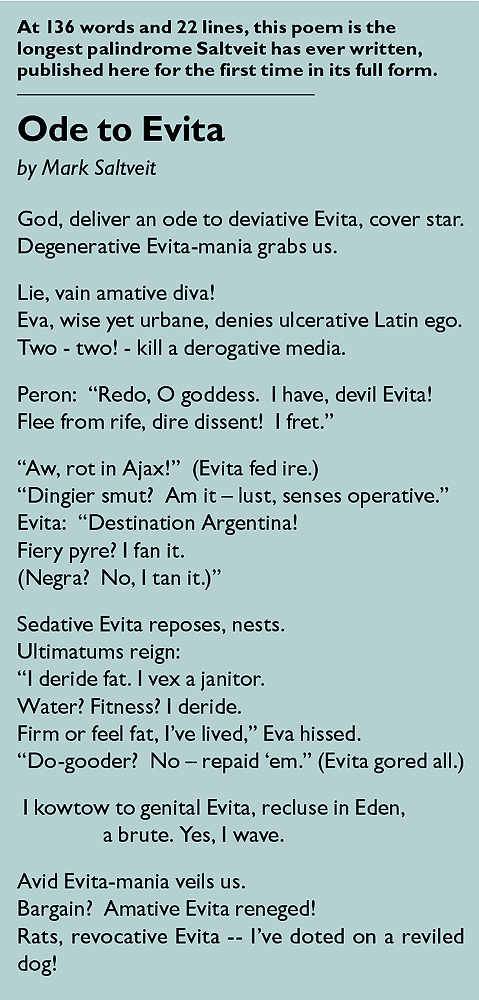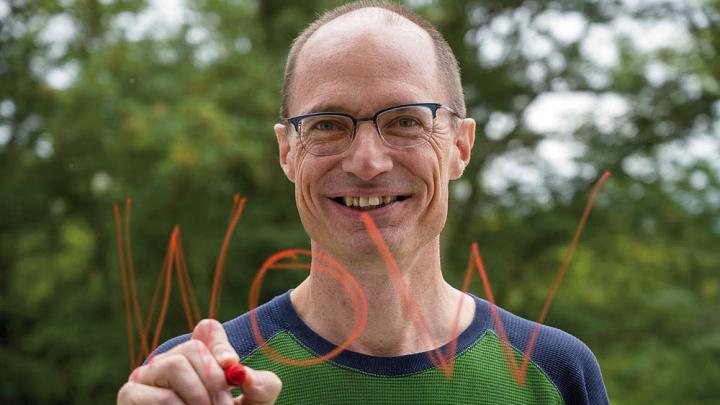“Kay fixes trapeze part; sex if yak…” was a promising start, but now palindromist Mark Saltveit ’83 needed one final, reversible word—one that would convey Kay’s questionable character and the conditions under which a yak would engage in adult activities. The judges had given him and the other 2012 World Palindrome Championship contestants 75 minutes to write palindromes using the letters “x” and “z,” but their time was almost up. Tuning out the competitors scribbling furtively beside him, Saltveit flipped through the handmade, 200-page dictionary of 29,000 palindromic fragments he’d constructed over the years. There, he found the key to unlocking his palindrome: “lived” in reverse spelled “devil.” Now his entry told a symmetrical, reversible story: “Devil Kay fixes trapeze part; sex if yak lived.”
With this single sentence, in the ballroom of the New York Marriott at the Brooklyn Bridge, Mark Saltveit became the first World Palindrome Champion.
Stand-up comedian and writer Saltveit grew up among wordsmiths. Between bilingual puns and nonsense phrases, his family played around with words so much they even invented some of their own. Saltveit’s father came up with “smeaf” (rhymes with deaf) to describe someone without a sense of smell; his brother replaced the humdrum word, “eye mask” with “eye hat.” He and his brothers wrote palindromes to pass the time on their family’s “insanely long, boring camping trips,” but their grade-school age attention spans were no match for the patience a palindrome requires. The best they ever did was “radar kayak radar.” Discouraged, Saltveit says he “gave up on palindromes for like, 20 years.”
Then one night in 1993, he couldn’t sleep. Now 31, he was about to get married and start his own company teaching business clients to use various computer software—all of which added up to insomnia. To pass the time, he tried writing a palindrome. He found peace in the form’s constraints. “When you write a palindrome, your choices are very limited. You have to accept what the language gives you and work with it,” Saltveit said in a lecture earlier this year at the Paideia Institute for Humanistic Study. “As someone who identifies with philosophical Daoism, I like that I have to admit I’m not in control.” The language led him to his first real palindrome that night: “Resoled in Saratoga, riveting in a wide wale suit, I use law, Ed. I wan, ignite virago, tar a snide loser.” He titled it, “The Brag of the Vain Lawyer.”
After that, Saltveit began seeing the world backward. The innocuous name “Dennis” led a double life as the verb, “sinned.” The highway exit sign for “The Dalles” outside his native Portland, Oregon became, “Sell ad, eh?” with a leftover “t” from which to build the rest of a palindrome. Saltveit writes his phrases from the middle outward, so the center word must have extra letters on either side to serve as points of departure, he says. “If I see a word like ‘civic,’ that’s almost a dead-end because the possibilities of what could come after it are infinite, which means in a way they’re zero.”
By the mid-1990s, Saltveit was “obsessed,” and like many others in the 1990s with a niche obsession, he started a zine. The Palindromist launched in 1996 as a way for the 30 or so enthusiasts around the world to share their work and learn about palindromy. Doing research for his articles, he found that the history of palindromes was vast and virtually untouched by scholars.
“There’s an above average percentage of really interesting, smart weirdos among palindromists throughout history,” Saltveit says. The form was most likely invented by Sotades the Obscene, a third century BCE Alexandrian poet, known for criticizing the ruling class in his poetry and maybe dressing as a woman. “Imagine Doctor Frank-N-Furter from The Rocky Horror Picture Show as an underground rapper and you’ll have some idea of what Sotades the Obscene was like,” Saltveit says. His studies also brought him to Thomas Urquhart, the seventeenth-century literary translator, Scottish political “rabble-rouser”, and “flamboyant spendthrift compulsive liar.” Urquhart, besides claiming direct descendance from Adam and Eve (and drawing a family tree to prove it), reported to have invented a language made entirely of palindromes. “There are so many incredible stories,” Saltveit says. And mysteries too, like the Sator Square: a Latin word square—a grid of five-letter words that read the same from top to bottom as they do from side to side. The Sator Square’s origin is unknown, and it’s been found everywhere from the first-century ruins of Pompeii to a fourteenth-century Swedish rune stone to a nineteenth-century Germanic magic spell.
“There’s something about the internal logic of a palindrome’s symmetry that makes you think it has to be true, whatever the content is.”
Saltveit’s latest research centers around why humans of the past were so drawn to palindromes like the Sator Square. “There’s something about the internal logic of a palindrome’s symmetry that makes you think it has to be true, whatever the content is.” For instance, “Sit on a potato pan, Otis!” feels like a pithy insult, even though no one has a “potato pan” in his kitchen cabinets. Palindromes can be useful, then, for pointing out the ways in which “language does not map to reality nearly as well as we think it does,” he says. He thinks of words as keys on a piano: “They make it easier to play the 88 tones, but you lose all of the tones in between…Palindromes help point out that words are just keys, just approximations.” In October, he’ll deliver a lecture on this theme at the Polis Institute in Jerusalem. Armed with only his undergraduate degree in social studies, Saltveit calls himself a “DIY academic”: “I’m just like, a guy with a liberal- arts education who started a zine.”

He’s being too modest, though. Will Shortz, New York Times crossword puzzle editor and organizer of the World Palindrome Championship, has called Saltveit the “king of palindromes.” He stars in both the 2015 documentary short, A Man, a Plan, a Palindrome, and the feature-length 2020 documentary, The Palindromists. He and poet Anthony Etherin are developing an improv palindrome show for next year’s Edinburgh Fringe Festival. As author Jon Agee has put it, Saltveit is the “palindromic ambassador.”
Twenty-plus years in stand-up comedy have turned the naturally shy Saltveit into a “confident introvert” capable of building a community around palindromes. Now with a circulation size of about 200, The Palindromist magazine unites a diverse group, from Utah Symphony principal bassoonist Lori Wike to computer programmer and 2017 Palindrome World Champion Martin Clear of Australia. Many have met in person and all of them communicate through chain emails where they riff off prompts like, “Write a palindrome that could be an epitaph,” or “Write a palindromic motel name.”
Among Saltveit’s many hats—comedian, freelance writer, “DIY academic”—why has he devoted so much of his life to palindromes? They “have given me a focus, something to pour myself into,” he said in the 2015 documentary short. Saltveit knows one small corner of the world backward and forward, perhaps more deeply than anyone else. “William Blake said to ‘see the world in a grain of sand,’” he says. “Palindromes are my grain of sand.”









